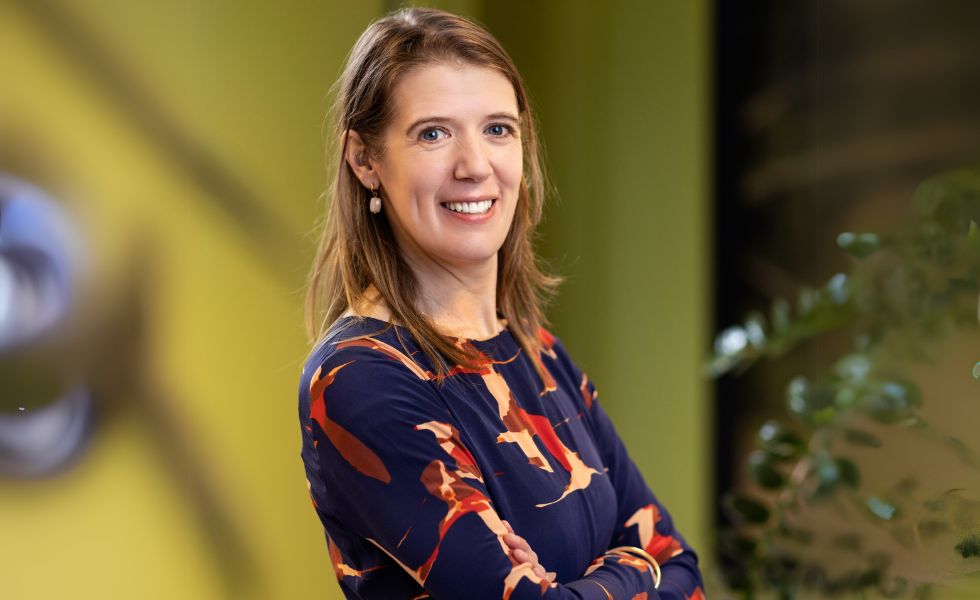Anne Kock-de Kreuk: Staying in conversation with each other

This interview was originally written in Dutch. This is an English translation.
Social relevance in her work, treating each other with respect and being able to make choices in freedom: it is all highly valued by her. Financial Investigator spoke to Anne Kock-de Kreuk, pension fund board member at PGB pension fund and Director of Education at Erasmus University.
By Lies van Rijssen
'My studies in technical mathematics focused on jobs in the field of logistics, physics or coding, for example. I did not envisage at all that I would do anything in the financial sector. I did become indirectly interested in it because of what my brother told me about it. He worked as a market maker on the options exchange. I ended up in Norway for an internship, where I attended lectures at the University of Trondheim on a specific kind of mathematics that I had to apply in my internship. The lectures were meant for people who worked in finance. Then something turned on me. For my graduation thesis, I specifically looked for a topic where I could apply technical mathematics in the financial sector. That was possible at an asset management company.
Getting that idea approved in Eindhoven, where I studied, took a lot of effort on my part. They felt that my research should take place at a technical company. I persevered and ended up at ABN AMRO Asset Management. They were ultimately very enthusiastic about my research and the result in Eindhoven. I quickly found my niche in the dynamics of the financial sector. In the beginning, it was mainly the combination of content and commerce that appealed to me, but later I was increasingly touched by the social relevance that work in this sector can have. Even at ABN AMRO I worked with clients from the pension sector. I subsequently never broke away from that.
I see the most important development in the financial sector as the emergence of sustainability as a central issue. This has brought with it a regime shift that forces us to look at financial markets and investment very differently. Old investment theories no longer hold water. It is evident that we need to deal with our earth, our environment and the people around us in a completely different way.
For the pension sector too, there have been many regulations on sustainability and SRI. But while those regulations mainly ensure that we are transparent about our investments and communicate unambiguously about them, we obviously cannot avoid fully integrating sustainability into our investment decisions. Otherwise, we will lose support and trust, and run far too many social risks, which naturally translate into financial risks later on.
Being open to each other's input and added value is essential for all forms of cooperation.
Not surprisingly, a major theme in my work is integrating sustainability into our fund's investment process and investment decisions. We are traditionally used to risk-return thinking. If you introduce sustainability into your investments, you naturally have to deal with less quantifiable issues.
Another big theme in my work is of course the upcoming implementation of the new pension law. Apart from being a pension fund manager, I am also training director of the asset management course for pension executives at Erasmus University. There, too, sustainability and the new pension law are the themes that receive the most attention in the programme. My two fields of work - managing a pension fund and university education - offer me the variety I need, and a nice form of cross-fertilisation takes place between the two.
Diversity is a hgely important issue for me. Integrating diversity into our policies is essential for good decision-making. As a board, it is imperative that we take note of enough viewpoints before taking a decision. In our fund's decision-making, I encourage diversity by explicitly considering the viewpoints of our advisers from inside and outside the organisation. Especially in a subject like sustainability, which is still uncharted territory in many areas, it is important to get diverse viewpoints on the decision-making table. Only then will you gain an eye for new perspectives. Even when there are vacancies on the board, we include the explicit desire to be diverse in the search for new directors, and that goes wider than just gender diversity.
I also consider inclusion very important. Everyone who works in our organisation should be able to feel at home here and feel heard. We are too inclined to listen mainly to people who look like us, have the same views as us. Inclusion is also about including people from different cultural backgrounds in decision-making. When I started as a director myself, I already had 20 years of experience in the finan cial sector and had seen many sides of it, but I did not yet have managerial experience. I could then call on my fellow directors to explain elements of the job that were new to me. For my part, I was able to contribute my knowledge and skills, which I had gained in my time as a supervisor at DNB, for example, from the very beginning. Being open to each other's input and added value is essential for all forms of cooperation.
Most of the substantive issues we encountered at DNB could ultimately be traced back to human behaviour.
An important insight I have gained in my work is that we all remain human beings. I came in here from a very theoretically oriented environment, but also with a natural interest in how things work around here. Gradually, I discovered that I am much more of a generalist than a specialist. But in the end, everything stands or falls with human behaviour and how we treat each other. That insight developed mainly in my nine years at DNB. Most of the substantive issues we encountered there could ultimately be traced back to human behaviour. That insight helped shape me as a director and, among other things, it made me good at distinguishing between main and side issues. I think I realise fairly quickly where real risks are. I have also learned to distinguish many styles of governance, good and not so good. And I have gained people skills and learned to suspend judgement. I try to get out of something by engaging in conversation. Always. At DNB, I was also trained in that. I think I still benefit every day from what I learned there, consciously or unconsciously. I also learned a lot about human behaviour during my time at Montae, where I often sat at the table with boards and watched board members operate together.
The most important moment in my career has been penetrating the realisation that my heart beats faster when I can mean something to society, do socially relevant work. That realisation didn't happen overnight, it developed. I knew afterwards that in all subsequent steps in my career, I would put that social relevance at the top. I should always be able to explain to myself the social relevance of my actions. In my current positions, that relevance is perfectly clear to me.
Time remains my biggest challenge: there always seem to be too few hours in a day and too few days in a year. Both privately and in my work, I always have a lot of plans. It is then a matter of getting the right focus and making choices. I am getting better at this. I notice that I am now more in control of my many plans. Of course, we also live in times when a lot is possible and a lot is asked of us.
The most important moment in my career has been the realisation that my heart beats faster when I can mean something to society.
So I find inspiration in subjects that are socially relevant. Part of my spare time is spent working for the investment advisory committee of the Vfonds, the fund for Peace, Freedom and Veterans. This charity develops activities that contribute to freedom, democracy and recognition and appreciation of veterans. My motivation for doing so is that I think it is very important that we in society stay in dialogue with each other on all fronts, treat each other with respect and ensure that we maintain democracy together. Especially in these times, I think it is extremely important to engage in this.
My three children - they are between six and 12 - all play rugby, a sport in which respectful interaction is also very important. I would like my children to gain self-confidence in making their own choices, to be their own person and do what suits them. That is the most important thing I can give them. Sometimes that is difficult. I sometimes push them in directions they haven't asked for. When I notice that, I correct myself. Behind this is the realisation that I am responsible for my own choices and want to be, even when those choices sometimes deviate from what others think or thought I should do. The fact that I have always chosen my own path has given me a great sense of job satisfaction and freedom. I really wish that to my children.
I also like to read. Currently on my bedside table are ‘About Strategic Thinking’ and Jan Brokken's ‘The Justified’. In it, Brokken shows on a completely different level how important it is to make your own choices. I also enjoy visiting museums and doing sports.
Yes, there are really too few hours in a day to do all this as often as I would like.'
|
Anne Kock-de Kreuk Anne Kock-de Kreuk studied Technical Mathematics at Eindhoven University of Technology. She became a Director at Pension Fund PGB in 2023 and, since the beginning of 2024, is also Training Director Certified Pension Executive Asset Management at Erasmus University. Previously, Kock-de Kreuk was Senior Consultant Risk & Investments at Montae & Partners for several years and held various supervisory positions at De Nederlandsche Bank for nine years. In her spare time, Kock-de Kreuk is a member of the investment advisory committee at the Vfonds (National Fund for Peace, Freedom and Veterans). |










